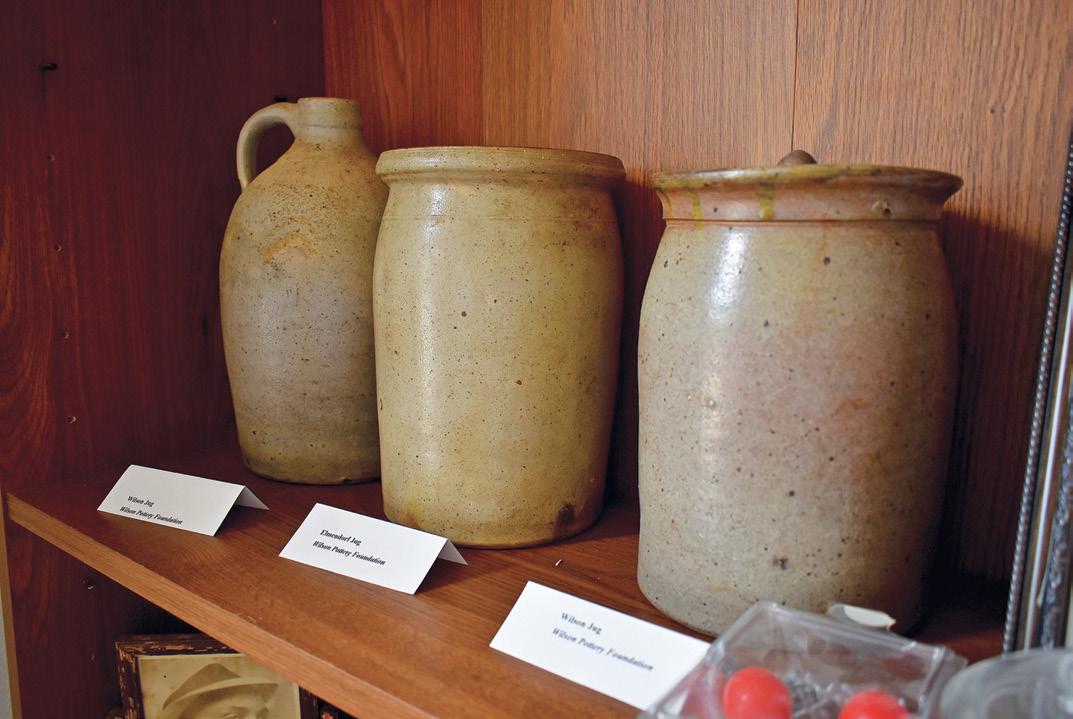
5 minute read
Sculpting a future
The Legacy of Wilson & Company
STORY AND PHOTOS BY JOE MARTIN
More than 150 years ago, Guadalupe County was home to the first documented African American-owned business in Texas — H. Wilson & Company.
Owned by freedman Hiram Wilson, the lucrative pottery business was host to various innovations, quality, and now renowned history that has made Wilson Pottery a coveted brand sought after to this day by collectors and museums alike.
The origins of H. Wilson & Company began when Presbyterian minister John McKernie Wilson moved to the area from Missouri with his family of nearly a dozen children, and 19 slaves. According to the Sebastopol House historic guide Robert Gray, Wilson’s 1856 move was motivated by a quest for clay.
“When John McKemie Wilson came out here — there’s a problem with the area of Seguin making pots, and that is because there’s a lot of lime around here,” Gray said. “You get lime into clay, it explodes. It’s calcite and calcite in clay makes it blow up. So they had to find a place where there was clay, and they found a place out in Capote Hills.”
Although McKemie didn’t know much about sculpting clay and all it entailed, he opened the doors of Guadalupe Pottery in 1857.
“He had 11 kids to raise, which is quite a lot,” Gray said. “And he was going to be a circuit rider and a circuit preacher, which is a lot for him to do. But he still wanted to have a pottery business because it was traditional in those days because most ministers couldn’t rub together a couple of nickels, so they always had a separate business.”

To compensate for his lack of business know-how, McKemie arranged for his slaves to learn the art of pottery making. Among those who learned how to mold the clay was 19-year-old Hiram.
For a dozen years, throughout the American Civil War, Guadalupe Pottery prospered until McKemie was called back to the East Coast by his church in 1869. He sold his business and moved back east.

Freed after the end of the Civil War, Hiram purchased a piece of property not far from the former Guadalupe Pottery site. With the assistance of Baptist minister Leonard Isley, Wilson transformed the land into H. Wilson & Company’s home.
“Reverend helped a lot of Black free people here,” Gray said. “He helped set up a lot of churches down here, but he helped Hiram – with the money Hiram had saved … purchase the business.”
Under Hiram’s guidance and the employment of James Wilson, Wallace Wilson, Andrew Wilson and George Wilson, all slaves owned by McKemie who worked at Guadalupe Pottery, H. Wilson & Company would go on to make big waves in the Texas pottery world.
“He (Hiram) would become the first ex-slave in Texas to own a business,” Gray said. “He did really good, and he not only took over the company, he actually changed a lot of the ways the pottery was made.”

Hiram’s innovations included the use of salt glaze instead of alkaline glaze, a redesign of vessel handles into the shape of a horseshoe and fitted lids.
Hiram stamped the company’s name on about 15% of the pots manufactured by H. Wilson & Company as well as imprinting the size of the vessels for easier use.
H. Wilson & Company remained lucrative until Hiram’s death in 1884. However, during his time in business, Hiram used his wealth to do more than make pots. He shared his wealth with his fellow freedmen, said Jan Britt Dixson, Wilson Pottery Foundation president and descendant of Hiram Wilson.

“He was a Baptist minister, so he opened up a church in Capote, Texas, and he opened a school there,” Dixson said. “He acquired quite a bit of land, and he would sell it to our (Wilson) family members, so it sort of became like a post-freedman’s little town full of Wilsons. He’s actually buried at Capote Church on that site in the cemetery.”
Hiram learned mathematical skills as well as how to read and write, while under McKemie’s bondage. His pursuit of knowledge never stopped.
“He was extremely bright,” Dixson said. “He also had a lot of influence and helped assist with the opening of the Guadalupe College as well. He was educated at Bishop College in Marshall and the founder of Guadalupe County Baptist Church.”
After Hiram’s passing, James and Wallace joined the third iteration of Wilson Pottery owned by Marion Durham and freedman Thomas Chandler until the business was lost to a fire.
“James, his family, worked very closely with our family – the Hiram family,” Dixson said. “So he did a lot. We don’t know a whole lot about them. We just know that James was brought over as a slave with Hiram, and so Hiram opened up his business, and James worked along with him. That’s why it’s called Wilson & Company. He was part of the company, and so was Wallace.”
The story of Hiram and his fellow Wilsons’ triumph led Dixson’s mother, Laverne Britt, to open the Wilson Pottery Foundation in 1999 after discovering a unique link in her lineage.
“My mother is actually the great-granddaughter of Hiram,” Dixson said. “And her reasons to open the Wilson Pottery Foundation was to spread the history and to give motivation to people because we think it’s a great story. But also the Wilson Pottery Foundation — we are in need of benefactors to help us purchase some of these pieces.”
So far the foundation and Wilson descendants have managed to accumulate a handful of their ancestral pottery pieces, but are always searching for more through donations.
Preservation and accumulation of the pottery aside, Dixson said the story of Hiram and his accomplishments is a tale of perseverance that should be celebrated.




